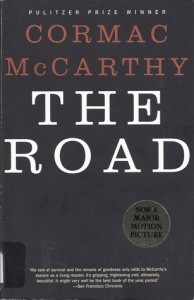 The first time I picked up The Road by Cormac McCarthy, I read it almost straight through, and I was devastated by the bleakness of the post-apocalyptic world. The second time I read it, I leafed through its pages to see if I could find hope among the ashes.
The first time I picked up The Road by Cormac McCarthy, I read it almost straight through, and I was devastated by the bleakness of the post-apocalyptic world. The second time I read it, I leafed through its pages to see if I could find hope among the ashes.
Is The Road the Most Depressing Book Ever?
On re-reading this book, I realized McCarthy actually treads a careful line with The Road between despair and hope.
From the very beginning, he plays dark against light. The first sentence speaks of “the dark and the cold of the night” and then how the man reaches “out to touch the child sleeping beside him.” Together they are experiencing “Nights dark beyond darkness and the days more gray each one than what had gone before.” And then McCarthy writes again of the child and his “precious breath.”
As a reader I was teetering between the sadness of the world and the possibility that maybe they could survive and remake the world.
McCarthy continues this precarious balance throughout the book and the juxtaposition kept me in tension. One scene shows “old crops dead and flattened” and the next “dreams so rich in color.” Beneath burnt orchards lie bunkers filled with food.
I started to realize that though I remembered the darkness of the book, there was a great deal of light in it. As the man says, “This is what the good guys do. They keep trying. They dont give up.”
Spoilers Ahead
Death is a continued presence in the book. Whether it is implied like when the boy asks, “Are we going to die?” and the man’s response “Sometime. Not now” or the less subtle bodies hanging from rafters or the baby roasting over a fire.
The man’s slow decline into death does not come as a surprise. But really, death (usually in less colorful ways) is a constant presence in any life. In fact McCarthy is dealing with a normal element in any normal parental relationship—parents always hope their children outlive them. The only difference is what the parents expect to die of and how soon.
The man and the boy make some really stupid mistakes throughout the book. First of all, they stick to the road. Then wander blindly into choke points like bridges that could easily be traps. They get their food stolen. And somehow they survive. It’s as though their lives are charmed (at least in comparison to some of those around them).
The Children Are Our Future
The greatest hope in The Road is the child. The father protects his son and dedicates all his resources to the child’s survival and happiness. He gives the Coke and often his food to his son. “The boy was all that stood between him and death.” Even as he is dying, the father insists that the boy “carry the fire.” He tells his son that he’s “going to be lucky.”
It is possible to imagine any surviving family units playing out the same struggle to save the life of the child. This is signaled when the man remembers a scene with his own father when they had stood at the same overlook when he was a child. History repeats itself in a way, even through great world changes. The child is the future of our species.
But the child is more than just a genetic continuation. The narrative speaks more than once of the fire that the child carries. I believe that fire to be the fire of civilization. What leads me to believe this is how the father focuses on daily survival, while the child is the one who sees beyond himself to ask, “What are our long term goals?” The child the one who insists that they feed Ely. He thinks of the other boy.
The child is generous and conscientious. He can afford to be because he is protected. We, in our daily lives where a traffic jam seems like a struggle for survival, would do well to remember what the stakes really are and to spend more time thinking about humanity.
The End
I cried my way through the last twenty pages of this book, again. So in that way the book was still devastating. And then there was the interlude with the trout and “the vermiculate patterns [on its back] that were maps of the world in its becoming.” It was a beautiful paragraph, but it did not fill me with more hope than I already had. In truth, all that paragraph did for me is make me want to re-read the ending of A River Runs Through It.
So is McCarthy an optimist? I don’t know if I would go that far. But his view of the world is much more complex than I originally gave him credit for and I was glad to find that we had some common ground.
This post was inspired by a couple of late night conversations with my tribe of writers. As always, I am grateful to them for their community and to my husband. Each of them helps me search for what is important in writing and in life.
If this review made you want to read the book, pick up a copy of The Road from Bookshop.org. Your purchase keeps indie booksellers in business and I receive a commission.